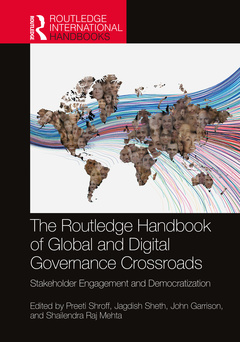Description
The Routledge Handbook of Global and Digital Governance Crossroads
Stakeholder Engagement and Democratization
Coordinators: Shroff Preeti, Sheth Jagdish, Garrison John, Mehta Shailendra Raj
Language: English
Subjects for The Routledge Handbook of Global and Digital Governance...:
· 17.4x24.6 cm · Hardback
Description
/li>Contents
/li>Readership
/li>Biography
/li>
This handbook maps and analyses cross-sector (public?corporate?social?community?faith) governance theories, models and practices as they are evolving in a digital world. It studies human, cultural, societal, institutional interactions, and challenges in a digitally enabled world, especially in the context of post-Crisis resilience and agility.
Every global crisis forces societies and nations to realign, while addressing deeper structural and cultural issues in governance. The Covid-19 pandemic has necessitated swift local to global governance responses for timely digital innovations for health crisis interventions, economic recovery, and societal equity. While every nation-state is developing global pandemic responses in a digitally enabled world, the deeper crisis of human, institutional, and societal governance deficit is also evident. This handbook documents digital governance innovations that enhance stakeholder engagement and inclusion for resilient, accountable and effective governance across sectors.
The volume reflects on a range of theoretical frameworks adapted for understanding global and digital governance. It looks at
? International Governance Collaborations
? Corporate Governance Reform
? Education Governance Innovations
? Public Sector and Urban Governance
? Health System Governance
? Sustainability and Environmental Governance
? Community and Faith-Based Governance
? Digital, Cultural and Creativity Governance
This book is unique as it presents important work on post-covid digital and democratic governance, and brings together holistic - interdisciplinary and inter-sectoral perspectives from the global north and south - engaging the leading scholars, practitioners, businesses, and civil society. It will be of interest to multi-sector institutions and global audiences: governments, corporates, social sector institutions, digital entrepreneurs, students and researchers, academic professionals, policymakers, public and private sector institutional leaders, organisational and entrepreneurial innovators interested in the field of Governance.
Preeti Shroff-Mehta currently serves as the Professor, and Director of Executive Education at Northwestern University – Medill School, USA. She has served as the Dean of MICA – The School of Ideas in India, and Dean at SIT - World Learning in Washington DC and Vermont. She worked as the Director for Democratic Governance and Civil Society Capacity Development with World Learning in Washington DC and led international development programs in Africa, Asia, The Middle East, Europe and Latin America in collaboration with The World Bank, USAID, UN, The Ford Foundation and many other international agencies. Her academic teaching also include include SAIS - Johns Hopkins and University of Maryland, USA.
Jagdish N. Sheth is Charles H. Kellstadt Professor of Business, Goizueta Business School, Emory University. He is globally known for his scholarly contributions in consumer behaviour, relationship marketing, competitive strategy, and geopolitical analysis. Over 50 years of experience in teaching and research at University of Southern California, University of Illinois at Urbana-Champaign, Columbia University, MIT, and Emory. He is the recipient of all four top awards given by the American Marketing Association (AMA). Additionally, he received the Global Innovation Award and Marion Creekmore Award, both from Emory University. Dr. Sheth has been advisor to numerous corporations all over the world. He has authored or coauthored more than 350 papers and numerous books.
John Garrison is an accomplished international development professional with extensive experience in program management, participatory approaches, and strategic communications. He retired from the World Bank in December 2015 after working for 20 years as a Civil Society Specialist and continues to work there as a senior consultant. He spent the first five years coordinating outreach to civil society in the Bank’s office in Brasilia, Brazil, and was the head of Bank’s Global C




